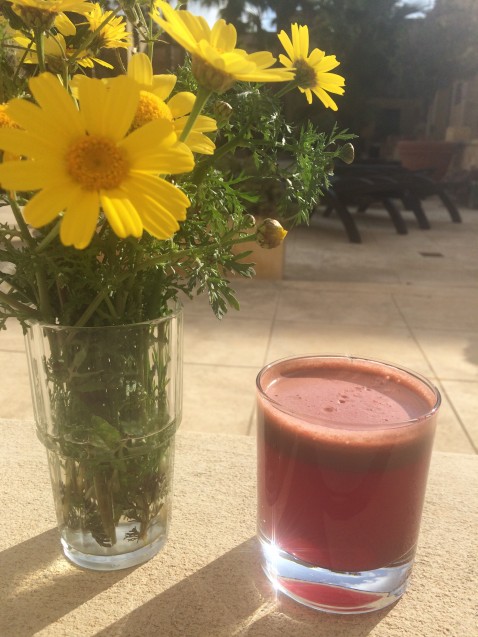
I recently came back from a fasting retreat in Gozo. The other participants were great fun and we shared the highs and inevitable lows with a warming solidarity and genuine kindness toward each other not often seen in the hectic race of life in the city. A juice fast is something I believe everyone should try at least once in their lives if they are able. It is an ancient practice that has been used throughout history for both cleansing and spiritual awakening. It is intense, and not suitable for all conditions, but the effects are certainly profound.
Going down to come up
During a fast, your body goes through a deep detoxification process. Toxins are stored in our fat cells to keep them out of general circulation, so as you break down fat during the fast the toxins are liberated and make their way out for elimination. As this happens, old symptoms can flare, it often gets pretty hairy and unpleasant before you a rewarded with a wonderful surge upwards.
Emotional toxicity is also released – old thought patterns, negative beliefs about yourself, anxieties – all come bubbling up to the surface and burst into your headspace like an unwelcome guest. The physical and emotional symptoms can be very challenging. Day 3 is notoriously difficult – on day 3 of this fast I felt irritable, sad, tetchy, tired and my skin flared up. Thankfully, the worst period lasts 1-2 days at most. Around day 5 I had championed through the hardest part and felt blissfully calm, content, and deeply connected to myself and to nature.I was wandering about the island smelling all the flowers and gazing out at the ocean with the wind in my hair like some kind of alpine fairy (sadly I don’t think I looked like one – I spent most of the fast in a saggy pair of tracksuit bottoms, moth eaten jumper, hiking boots and extremely greasy unwashed hair!). It’s actually really nice to let it all hang out sometimes, I find deciding what to wear such a chore, so wearing the same thing every day was incredibly liberating, even if I did slightly alarm the other guests with my somewhat manic and dishevelled appearance.
My daily routine
The daily juices were enough to keep my energy up and provide my body with a steady stream of nutrients, and an evening broth provided a beautifully warming and soothing way to close the day and replace electrolytes lost through sweating in the sauna. I went for gentle walks, did some restorative yoga, exorcised any negative head mush onto the pages of my journal, had long luxurious baths filled with essential oils, read my book and even braced the extremely chilly (but very invigorating) swimming pool. I did as much or as little as I felt like, and several times retreated to my bed with a hot water bottle. When do we ever give ourselves the permission or time/ space to do this? Even if we go on holiday, there may be a tinge of anxiety over making the most of the holiday and experiencing as much as possible. FOMO (fear of missing out) can be a destroyer of our peace. To me it feels dangerous to bring our constant mission to achieve in all areas, into the realm of our holidays, which are meant to serve the chief purpose of relaxation and recuperation.
On a juice fast, achievement anxiety isn’t really possible, unless you are solely focused on weight loss, which I don’t recommend as a principle reason to go on a fast (small, gradual changes in food and lifestyle that are adhered to for the long term are the only way to lose weight and keep it off!)
Emotional ties to food
Surprisingly, hunger is not really an issue on a juice fast; once your body understands that food is not on the agenda it slows down your metabolism and reduces your digestive function. Without the hunger, you get to fully appreciate all the emotional triggers which make you think about food.
Food serves many more purposes than simply to provide us with fuel. It can serve the role as:
- Reward
- Celebration
- Comfort (I am sad/angry/frustrated/bored/procrastinating/overwhelmed/anxious/feeling guilty)
- Punishment (I have been ‘bad’ this weekend, next week I am going to only eat 1000 calories per day/ only eat salad/ I am going to be really ‘good’)
It is interesting to see how you respond when the act of eating is completely removed; it is only then that you truly discover your relationship with food. Once you understand this, you can then focus on the areas in which the triggers are the strongest and find other ways of dealing with strong emotions (meditation, EFT and journalling are some of my favourites).
Feeling fresh as a daisy
Despite their intensity, juice fasts are an excellent tool to help the body heal. The body delights in taking action to clear out old rubbish when we give it some time and space. Towards the end of my fast, I was blessed with bright, shining eyes, clear skin, enhanced energy, a much calmer mindset/ a sense of peace and springy rejuvenated organs; it was well worth it.
Back home I had an enhanced sense of taste and smell – tomatoes tasted as sweet as mangoes, avocados as buttery and delicious as flapjacks, and the scent of daffodils in my kitchen lingered at my nose like a heavenly perfume. I went back to my work with a renewed sense of purpose, a clear de-fogged mind and a more positive outlook. This is what a true rest really feels like.

Who is a juice fast not suitable for?
- Pregnant or nursing mothers
- People with severe adrenal fatigue
- In cases of severe malnourishment, anaemia, anorexia or bulimia
- Those with an active infectious disease
- Diabetes Type 1
- Hepatitis
- Kidney failure
(This list is by no means exhaustive – always consult your physician if considering a fast)
Food based detox as an alternative
For those individuals where a juice fast is not suitable, or they feel it would be too intense, there are plenty of more gentle food based detox regimes out there. Generally, a good detox plan would involve removal of foods that are difficult to digest, very acid-forming or likely to cause immune response in the body such as dairy, gluten containing foods, alcohol, sugar etc, and replace instead with an abundance of dark green leafy vegetables, antioxidant rich berries, good quality sources of protein and fat, fresh herbs and perhaps some targeted supplements to help aid the liver detoxification pathways and the kidneys. As an intro to detoxing, I like Patrick Holford’s 7 Day Liver Detox plan, it is manageable, affordable and safe for most.
Detoxing at home?
I don’t usually recommend something as intense as a juice fast when you are in your normal routine. There are too many distractions, daily life and work is too taxing as you go through such a deep process. You need to be in a safe space where you can be taken care of whilst things unravel, it is also good to be supported by a health practitioner whilst you’re on your journey, who can make tweaks as and when necessary. However, a more gentle food based detox is a good alternative, and there are also plenty of ways to aid the body’s natural detoxification process which you can incorporate easily into daily life. With this in mind, I have written a gentle detox guide. Following some or all of these steps will have a profound effect on your health. Our environment is now full of pollutants and chemicals – it’s in our water, our food and the air we breathe; but let’s not be fatalistic, let’s take action. I hope you find this guide useful.. read it here.

0 Comments